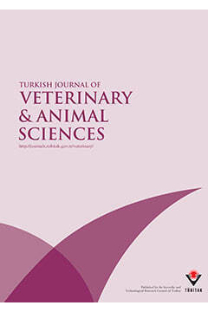Detection, cloning, and sequencing of the enterotoxin gene of Clostridium perfringens type C isolated from goat
Clostridium perfringens enterotoxin (CPE) is an important virulence factor involved in C. perfringens food poisoning and other gastrointestinal illnesses. In our experiment a Clostridium perfringens enterotoxin gene (cpe) positive type C strain was obtained by multiplex PCR from 34 C. perfringens isolates from goat in Guizhou Province, China. Then a pair of specific primers was designed and synthesized according to the published cpe gene, and the complete cpe gene was amplified from the genomic DNA of the cpe-positive C. perfringens isolate. The PCR product was cloned into pMD18-T vectors and transformed into competent cell DH5a. The recombinant plasmid was identified by PCR and restriction enzyme then sequenced and analyzed. The results showed that the cloned gene was 960 bp in length; the gene coded 319 amino acids, which shared 99.4~99.8% sequence identity and 99.1~-99.7% amino acid sequence identity with reference strains in GenBank. These results provide a basis for further research on the structure, properties, and biological activities of Clostridium perfringens enterotoxin. It also set the groundwork for further investigation of the mechanism of disease caused by C. perfringens enterotoxin.
Detection, cloning, and sequencing of the enterotoxin gene of Clostridium perfringens type C isolated from goat
Clostridium perfringens enterotoxin (CPE) is an important virulence factor involved in C. perfringens food poisoning and other gastrointestinal illnesses. In our experiment a Clostridium perfringens enterotoxin gene (cpe) positive type C strain was obtained by multiplex PCR from 34 C. perfringens isolates from goat in Guizhou Province, China. Then a pair of specific primers was designed and synthesized according to the published cpe gene, and the complete cpe gene was amplified from the genomic DNA of the cpe-positive C. perfringens isolate. The PCR product was cloned into pMD18-T vectors and transformed into competent cell DH5a. The recombinant plasmid was identified by PCR and restriction enzyme then sequenced and analyzed. The results showed that the cloned gene was 960 bp in length; the gene coded 319 amino acids, which shared 99.4~99.8% sequence identity and 99.1~-99.7% amino acid sequence identity with reference strains in GenBank. These results provide a basis for further research on the structure, properties, and biological activities of Clostridium perfringens enterotoxin. It also set the groundwork for further investigation of the mechanism of disease caused by C. perfringens enterotoxin.
